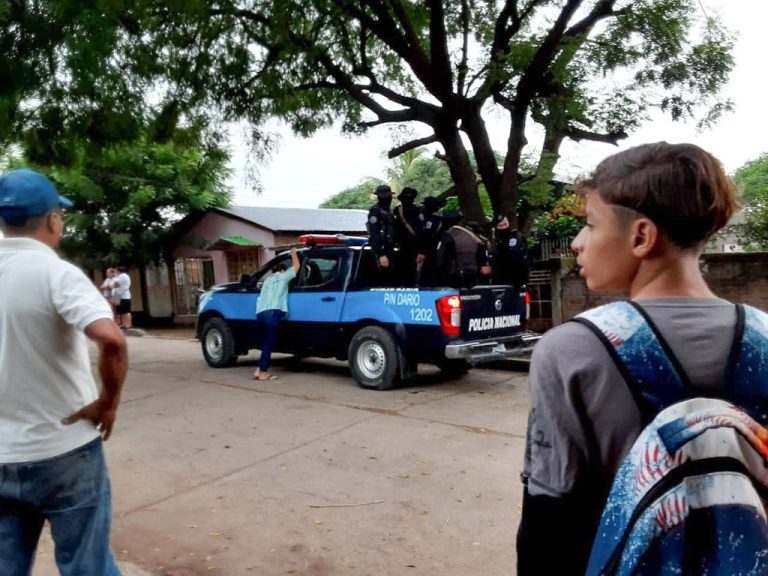7 de julio 2023

Children of Exile: The Births “Sowing Hope” in the Camp of Nicaraguan Farmers

PUBLICIDAD 1M
PUBLICIDAD 4D
PUBLICIDAD 5D
Regime approves constitutional and Police Law reforms. Specialists perceive it as "a sign of the weakness and desertions of the regime"

Foto: Archivo | Confidencial
The National Assembly, controlled by the dictatorship of Daniel Ortega, approved with urgency the reform to article 97 of the Political Constitution of Nicaragua and Law 872, Law of Organization, functions, career and special social security regime of the National Police; which completely subordinates this institution and punishes desertions within the main repressive arm of the state.
The reforms change the apolitical nature of this institution and now establish that the National Police is a subordinate body of the President. In addition, they "eliminate the civilian character" of the National Police and leave it only as "an armed body" under the orders of the regime, said security specialist Elvira Cuadra.
The bills were approved by the 91 deputies of the National Assembly and the amendment to the Constitution will become effective immediately upon its approval and publication in La Gaceta.
These reforms "set aside the apolitical, non-partisan (Police) and the preventive, proactive and community model that, according to everything that was said when it was approved in 2014, put people, families and the community at the center." Instead, it emphasizes "the task of preserving social order and internal order," Cuadra explained.
The reform to the Police Law adds three new articles: crimes committed by police personnel, breach of duties, and lastly, desertion.
When an officer "without just cause disobeys the orders of his superiors, to the detriment of citizen security, he will be sanctioned with a sentence of six months to two years in prison", reads the Police Law reform initiative.
In addition, desertion from the police ranks will be punished with imprisonment. "The police personnel that abandons the service, which is considered desertion, incurring in a serious damage to citizen security, will be punished with a penalty of two to three years in prison", adds the Executive in the proposal.
Both initiatives were discussed on Wednesday, July 5 at 9:00 a.m. in an ordinary session of the National Assembly.
These reforms come at a time when the Police is going through a reengineering process, in which retired commissioner general Horacio Rocha was appointed as the new Security advisor, 13 women were also promoted to leadership positions and several police chiefs - who were at the forefront of repression in 2018 - were separated from the institution.
A security researcher consulted on condition of anonymity assessed that the reforms ordered by Ortega "transfer the repression to the ranks of the Police," which is a situation that evidences "the high degree of distrust that the regime has over its people".
The source assured that the main motivation of the regime with these reforms is "to have absolute control of its servants, of its nucleus, so that there will be no more desertion", within the police institution.
With these reforms, the regime intends to "criminalize desertion" within the Police, commented the source. They added that "imprisonment for desertion was already included in Law 872", but in the last years the institution went through a process of "denaturalization" which increased the number of deserters.
In the same line, a source linked to the Police explained that generally when officers want to leave the institution they follow an administrative procedure and request their discharge. "With this reform that is eliminated, and they are instead proposing jail. It's a barrier to stop the bleeding of desertions," they said.
The Ortega regime has increased the personnel, budget, and police hierarchy, but the data on desertions is kept secret, only the high-ranking chiefs handle it.
Finally, the source emphasized that these changes are due to the fact that the dictatorship needs to "justify" its actions and give them a tinge of legality.
Editor's Note: This article was updated on July 5 when the reforms were approved.
This article was originally published in Spanish in Confidencial and translated by our staff.
PUBLICIDAD 3M
Confidencial es un diario digital nicaragüense, de formato multimedia, fundado por Carlos F. Chamorro en junio de 1996. Inició como un semanario impreso y hoy es un medio de referencia regional con información, análisis, entrevistas, perfiles, reportajes e investigaciones sobre Nicaragua, informando desde el exilio por la persecución política de la dictadura de Daniel Ortega y Rosario Murillo.
PUBLICIDAD 3D